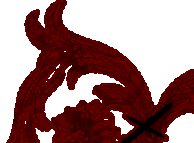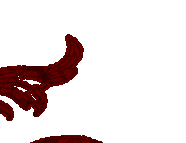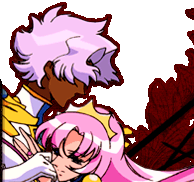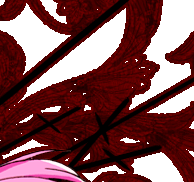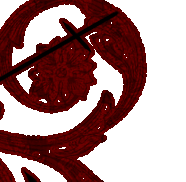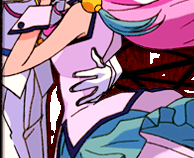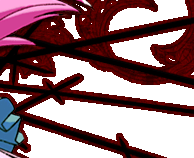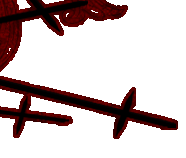
This analysis
was donated by Khalix. 
Juri’s Self-Actualisation in the second chapter of After the Revolution
Saito Chiho continues her After the Revolution manga with the same spirit and ingenuity she had for the original series. This chapter is a loose continuity where she wants to address the relationships between Shiori, Juri and Ruka. On the side-lines, is the ever-present fan Miki. In this continuity Juri has matured into a world class fencer and Shiori is her supporter and manager. The chapter entails aspects of the movie manga and movie Adolescence Apocalypse in understanding one’s trauma and getting over a psychological obstacle. It is about finally acknowledging something and growing up. It is not an easy read and it has its messiness but the ending to the chapter coalesces the spirit of Revolutionary Girl Utena and captures Juri in her prime. 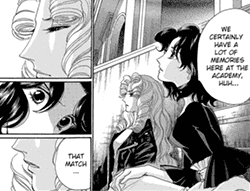
It is actually nice to see Juri and Shiori in a relationship where they acknowledge the other and are comfortable with each other. Is the relationship romantic? There is hints of that. Juri is in love with Shiori and Shiori does love Juri but perhaps she is a bit hesitant about her feelings. Juri was having a match where lightning struck and the battle was pre-empted. She believes she is losing her edge and wants to retire at the height of her career. Shiori, her supporter, is sceptical of this decision. Another reason Juri is quitting is because she seems to not escape Ruka.
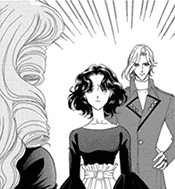
Wherever she goes and whoever she is fighting the person transforms to Ruka. It is taking a toll on her psyche. Either she desires to beat Ruka and do it right or just forfeit this struggle and walk away. We do not know why Juri has this undeniable animosity towards Ruka but we do know it is from a trauma. Soon Shiori introduces a boyfriend she had been kept hiding from Juri. Juri imagines this man as Ruka and starts accusing him of getting in-between Shiori and herself. Shiori is overwhelmed by Juri’s outbursts and her possessiveness and she leaves in dismay not knowing what to do. At the time, it is unclear if the man really is Ruka or someone Juri imagines. Juri is heartbroken. We are given a short flashback as to why Juri became a fencer. She wanted to love and impress Shiori so she joins duelling. Her efforts work and Shiori notices her. 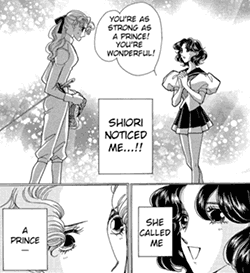
Only to see that Shiori is engaged to Ruka. She feels anger and resentment towards Ruka and at herself. She doesn’t know what to do about her feelings of hatred towards Ruka and her romantic feelings towards Shiori. This is completely a different imaging of Juri. It can be how Utena is reimagined in the movie and movie manga; as a force of tempestuous nature and forthright attitude. This Juri is not ice cold but rather like fire. She is not shy to pursue the person she wants and isn’t keen in hiding her loathing for someone she thinks is responsible for her romantic failure and misery.
Of course, this may not understandably sit well with many fans. Shiori is not the spiteful girl who has internalised homophobia. She actually admires Juri and loves her prince hood. She acknowledges Juri and has maintained a very poignant and deep bond with her. In some ways, this makes Juri’s plight more painful. The fact she is now closer to her loved one but she cannot bridge the gap between the platonic and romantic. Nevertheless, this relationship in the manga has sensual and sexual overtones. There can be no denying that Shiori has some non-platonic feelings for Juri, which come to light in her insistence that Juri keep on duelling and her loving Juri as a prince.
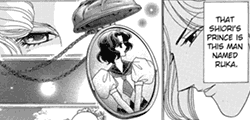 This is where the existential and ontological question of the orthodox prince is transferred from the manga, movie and series and instead put onto Juri. Is the prince Shiori loves sustainable? Juri is frustrated because each duel does not make her closer to her person of love rather isolates her. It is not merely because she is a woman but rather being a prince can be taken as duelling machine, a carnivalesque entertainment but not with any set-goals in check. It beckons the age-old ailment of Dios reduced to sickness and effacement because he cannot be everyone’s prince. The question here is can you also always be the orthodox prince for the one you love? 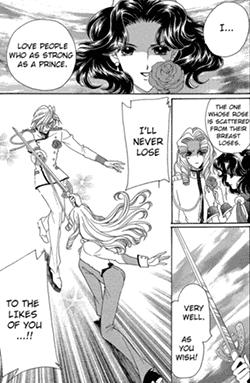 The question is asked and in it is Juri’s story. Juri is angry about “losing” to Ruka again. She takes out her pendant. The one containing Shiori, like a talisman of her strength. Only to have Ruka steal it away from her. Juri is now enraged beyond any reconciliation. She feels Ruka is humiliating her. Not only does he have Shiori’s love but he has the audacity to run off with her pendent. Juri is hell-bent of damning Ruka to defeat if only to vocalise her frustrations and anger. Alas, there is another lightning that pre-empts the ongoing fencing match in the arena.
Juri wonders why this keeps on happening. It is like something or someone is affecting her battle. Ruka confirms this and implies that their battle is not merely a fencing tournament. Shiori is now dressed as a rose bride and is looking as manipulative as she originally did. This manga seems to ask if some of Shiori’s acerbic and volatile nature come from being an object of desire that actualises itself into the poisonous rose bride title. After all, when Juri isn’t being possessive and aggressive she does have Shiori’s support and love. It makes the readers reevaluate the entire system of prince and rose bride and its implicit corruptions. 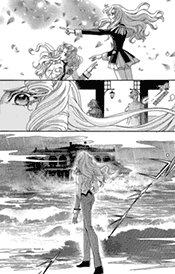 The duel doesn’t completely sit well with Juri but she is adamant in battling Ruka. The inverted castle has appeared and they are fighting on that precipice of birth and apocalypse.
However, Juri cannot keep up the battle. She is starting to lose. In panic, she wonders if once she can actually truly be a prince. Her prayers have been answered, Utena descends from the heavens and comes before her as the prince-head to inspire her to fight. Juri is enchanted and elated. She can now win her battle with Ruka and finally end all her suffering.
However, Utena is not Dios. Dios’s function was to maintain illusions and the social system of duelling. Utena progresses to the truth. She shows Juri her truth. One day, whilst she was admiring Shiori from afar she sees her love fall into the lake. Juri in desperation goes into the water. She saves Shiori but cannot save herself. For a moment, though frightened she is ready to accept her fate. Only to have Ruka save her. And, die in the process in saving her.
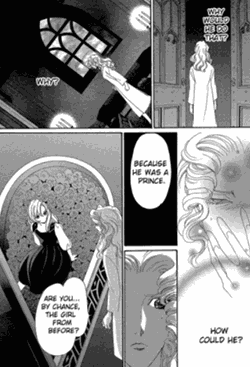
Juri is obviously pained with what happened. She feels responsible for killing Shiori’s fiancé and also feels responsible for the death of a young man. Angered by her own perceived weakness and feeling she was also culpable for hurting Shiori, she had erased this memory from herself. It is similar to Utena not remembering that Touga had died in the movie and movie manga. Unlike Utena, who does seem to long for Touga as a form of stability in her life, Juri beckons the opposite. She resents Ruka because she believes she failed being a real prince by causing his death. So, her anger was then always pointed towards Ruka to mask her guilt. Yet, Utena does not think so. Neither does Ruka. Ruka has always loved Juri. Juri is a goddess of battle. Her person so fierce, elegant, powerful and undeniable that no one can truly refuse her. She is Lily, the goddess of battle. Juri is speechless. She cannot believe her highest compliment, the one that entails her core, has come from her greatest adversary. 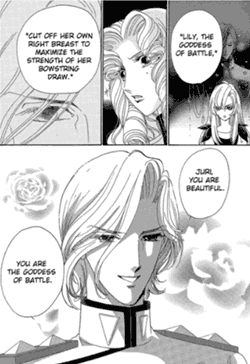 However, it seems Ruka has never treated her as an enemy. Neither does he hold her responsible for Shiori being heartbroken at his loss. These things were destiny and not under her control.
In a last proclamation of love, Ruka kisses Juri’s scarred breast, the one that always reminded her of the drowning. Utena leaves with him. Juri starts crying. She acknowledges Ruka and his feelings and she acknowledges the truth Utena gave her. She is human. It is completely understandable to be vulnerable and not feel strong all the time.
With the battle ended Juri can finally move forward. She has dispelled the Prince mythos.
Juri finally wins her final duel. It is with another woman, a normal opponent. She had dispelled the feelings she had for Ruka. He is now just a fond memory. And, Shiori is happy and comes and greets her. 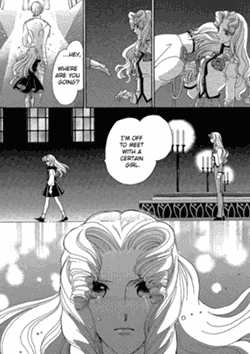 Shiori is proud of Juri and she is worried that Juri will quit fencing. Juri does no such thing. However, she does say she will stop fighting for Shiori’s affections. She has gotten her locket back. She feels whole and fulfilled. She has realised that fighting for Shiori’s affections was not leading them anywhere. Shiori is not a princess to be won. If they are to be together, it has to be as adults who can love and heal each other. Shiori mentions that she had a dream of Ruka thanking them for treasuring him and leaving them to their own devices. Shiori is proud of Juri and she is worried that Juri will quit fencing. Juri does no such thing. However, she does say she will stop fighting for Shiori’s affections. She has gotten her locket back. She feels whole and fulfilled. She has realised that fighting for Shiori’s affections was not leading them anywhere. Shiori is not a princess to be won. If they are to be together, it has to be as adults who can love and heal each other. Shiori mentions that she had a dream of Ruka thanking them for treasuring him and leaving them to their own devices.
It is a hint that Shiori may now finally have a relationship with Juri or that Juri won’t relentlessly pursue her anymore. She had grown up. She doesn’t want to be someone’s prince anymore but her own autonomous being. Meaning that the orthodox prince was unsustainable. Ruka died trying to be a prince. Juri was never really an orthodox prince. She was a warrior in her own right. She loves to fight for the fight is wonderful and in her core, she is a fighter so the fight is for herself.  The ontological and existential question has been answered: there is no constant prince. Not one that keeps on saving someone or pining for someone. It is a failure and not the failure of the individual. Juri hadn’t failed anything but she has grown out of only trying to please an ideal of what her love wants. She is determined to be herself. Juri opens her locket and in it she finds her cherished picture of Shiori only to have Ruka engrave “Fight Juri” on the inside. She now holds both of them as precious and can move forward. The ontological and existential question has been answered: there is no constant prince. Not one that keeps on saving someone or pining for someone. It is a failure and not the failure of the individual. Juri hadn’t failed anything but she has grown out of only trying to please an ideal of what her love wants. She is determined to be herself. Juri opens her locket and in it she finds her cherished picture of Shiori only to have Ruka engrave “Fight Juri” on the inside. She now holds both of them as precious and can move forward.
 This loose continuity of Juri’s arc is an amalgamation of all the incarnations of Juri. Juri is still a bit bitter but not for Shiori. Like Utena from the movie and movie manga she is just unhappy with her weakness and doesn’t wish to encounter it. Her weakness is presented as a romantic rival in Ruka but it can be said she transforms him as such. He does understand and respect Juri. Just like she watched Shiori from afar he watched her. Unfortunately, he died trying to get recognition from her. Juri doesn’t wish to die and she just wants to push forward. She truly is the goddess of battle.
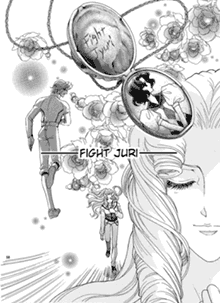 Chiho’s reimaging does entail a very healthy way of looking at Shiori and Juri. There is love there between them. Juri drags Ruka in. However, it is inescapable. In the end, she wanted to erase the fact that she may value someone who should instinctively be her rival. It is a very princely logic to treat “another prince” as a rival. However, it seems that there was no true rival to her and Shiori’s bond. Ruka cannot break it and it is only her own insecurities that causes problems. So, she accepts herself as for the goddess of battle this is a triviality. She can see and understand another warrior like her so she finally accepted Ruka. The Thorns in the title may be Juri’s own doubt and anger at herself. A prince is meant to save people but a prince may be ultimately divided from humanity if they don’t understand not everything is in their hands. Juri’s obsession of being a prince fades and she is able to just be a fighter in her own right: for herself.
 |

